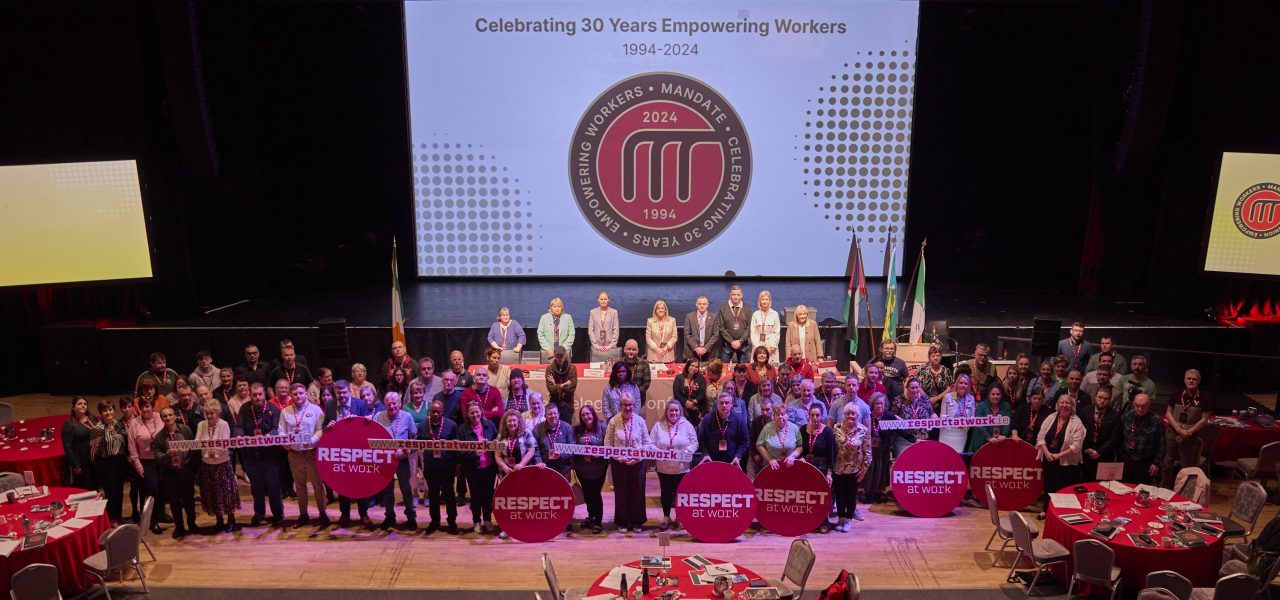
Motions to 2024 Mandate Biennial Delegate Conference
Friday 10 May 2024Industrial Relations
1. Proposed EU Directive on Adequate Minimum Wages
Conference notes that the proposed EU Directive on Adequate Minimum Wages which states that countries with lower than 80% collective bargaining coverage must present an action plan to the European Commission as part of its transposition of the Directive no later than November 2024. Ireland currently has a collective bargaining coverage of 34%. The Directive includes the following observations and references:
- “Calls on Member States to promote social dialogue and collective bargaining with a view to wage-setting.”
- “In-work poverty in the [European] Union has increased over the past decade and more workers are experiencing poverty.” (This is true in Ireland where in 2009, there were 91,407 adults living in poverty who had a job. Despite an economic “recovery”, this had increased by more than 42,000 in 2021 to 133,627.)
- The recognition that “it is more difficult for workers with non-standard contracts to organise and negotiate for collective agreements.”
- “Member States with a high collective bargaining coverage tend to have a small share of low wage workers and high minimum wages. Member States with a small share of low-wage earners have a collective bargaining coverage rate above 80%.” Ireland has among the highest prevalence of low pay in comparison with our EU peers, where one-in-five workers earn below the low- pay threshold. Only Germany has a higher proportion of low paid jobs among our EU peer group.
- “An effective enforcement system, including reliable monitoring, controls and field inspections, is necessary to ensure the functioning of and compliance with national statutory minimum wage frameworks.”
Article 4 calls on Member States to:
- “promote the building and strengthening of the capacity… to engage in collective bargaining on wage-setting;
- encourage constructive, meaningful and informed negotiations on wages between the social partners, on an equal footing, where both parties have access to appropriate information in order to carry out their functions in respect of collective bargaining on wage-setting; and
- take measures… to protect the exercise of the right to collective bargaining on wage-setting and to protect workers and trade union representatives from acts that discriminate against them in respect of their employment on the grounds that they participate or wish to participate in collective bargaining on wage- setting…”
While the Irish government has engaged with social partners including the trade union movement, the suggested proposals for the achievement of the above aims and objectives relies heavily on sectoral wage bargaining.
Conference notes that the best way to achieve the comprehensive aims and objectives of the Directive, including the increasing of collective bargaining coverage, tackling of low wages, establishment of decent work, reduction of poverty and the creation of a more egalitarian society, is through wide-ranging improvements to the industrial relations legislation which empowers workers and their trade unions. As such, this conference calls on the incoming National Executive Council to continue its collaborative work with like-minded unions and stakeholders and campaign for:
- A statutory framework for trade union recognition
- The “right to access” for trade unions to conduct inspections and discussions with members and potential members in the workplace.
- Enhanced penalties for Union busting, including the alignment of penalties for Unfair Dismissals for Union activity to the levels associated with Whistleblowing legislation.
- Ensuring trade union deductions at source are protected and by law.
- Reform of the 1990 Industrial Relations Act to remove restrictions on workers withdrawing their labour.
- Legislation to allow workers to access more hours at work when hours become available, as provided for by the EU Part-Time Workers’ Directive.
- The right for trade union activists to avail of trade union education facilities, including paid leave.
- Right to Collective Bargaining.
National Executive Council
2. Comprehensive Motion 1 (to be moved by Blanchardstown Local Council)
Access to Additional Working Hours for Existing Staff
This motion is in support and in furtherance of the findings of Mandate Trade Union’s Smoke and Mirrors report by Dr Conor McCabe of Queen’s University Management School, Belfast which was launched in 2023. Conference notes, that while the Employment (Miscellaneous Provisions) Act 2018 is in force, the mandated report on involuntary underemployment (Section 21) remains uncompleted. Conference further notes, that the European Union, Council Directive 97/81/EC (of 15 December 1997)
Clause 5,3(b) regarding requests by workers to transfer from part-time to full-time work or to increase their working time should the opportunity arise, has still not been transposed into Irish law despite the Directive being more than 26 years old.
Therefore, Conference instructs the incoming National Executive Council (NEC):
- Actively follows up on the completion of the required report on involuntary underemployment as per the Employment (Miscellaneous Provisions) Act 2018.
- Campaigns that the Council Directive 97/81/ EC (of 15 December 1997) Clause 5,3(b) is properly transposed into Irish legislation.
- Engages with relevant stakeholders, including government bodies, to ensure effective and timely realisation of these objectives, utilising union resources efficiently.
Covering Motion 28, Access to Additional Working Hours for Existing Staff – Blanchardstown Local Council and Motion 29 Ensuring Right to Access Additional Working Hours – Ballina Local Council. (Secondary Schedule, Category A).
3. Banded Hours and Full-Time Work
Conference recognises the importance of full-time employment which must be both secure and fair. Given this, Conference calls for the incoming NEC to seek amendments to the banded hours legislation which puts
fairness and security at its core in all forms of employment. Conference instructs the NEC to seek a model of full-time employment based on a ratio of 3 part-time workers: l full-time worker. Such a system would establish that for every 3 part-time employees employed,1 additional employee must be employed full time. Such a ratio should be sought and maintained in all workplaces. Furthermore, when full time positions arise, they must be replaced and offered to the next most senior worker in store. Should that person not wish to move to a full-time position, the next in seniority will be approached and so on.
Sligo Local Council Amendment No 1 (Motion 3)
The following words should be removed “and offered to the next most senior worker in store. Should that person not wish to move to a full-time position, the next in seniority will be approached and so on.” And replaced with “The full time-position should be advertised in the first instance internally to allow all existing workers in store apply for the position on a fair and equitable basis.”
Amended Motion Reads
Conference recognises the importance of full-time employment which must be both secure and fair. Given this, Conference calls for the incoming NEC to seek amendments to the banded hours legislation which puts fairness and security at its core in all forms of employment. Conference instructs the NEC to seek a model of full-time employment based on a ratio of 3 part-time workers: l full-time worker. Such a system would establish that for every 3 part-time employees employed,1 additional employee must be employed full time. Such a ratio should be sought and maintained in all workplaces. Furthermore, when full time positions arise, they must be replaced. The full time-position should be advertised in the first instance internally to allow all existing workers in store apply for the position on a fair and equitable basis.
Cork Local Council
4. National Minimum Wage (Equal Pay for Young Workers) Bill 2022
This Bill is aimed at removing the lower minimum wage rates imposed on those employed between the ages of 16 and 20. The Bill was proposed on the 14th of June 2023, however Minister of State at the Department of Enterprise, Trade and Employment, Deputy Neale Richmond, proposed an amendment which was accepted by a majority of mostly Government TDs. The amendment read “Dail Eireann resolves that the National Minimum Wage (Equality for Young Workers) Bill 2022 be deemed to be read a second time this day twelve months, in order to allow further consideration of the Bill.” Conference calls on the incoming National Executive Council to lobby, and to direct the Union’s Officials, to lobby Government to not only ensure this Bill is read a second time on the agreed date, but that it is in fact passed into legislation, and in doing so, bringing an end to this discriminatory and unjust treatment of young workers in this country.
Artane Finglas Santry Local Council
5. Trade Union Access to the Workplace
Conference notes the introduction of the Minimum Wage Directive in Ireland, and recognises the continued work being done by ICTU on this matter. Conference stresses the importance of provisions for trade union access to the workplace in this directive and instructs the incoming NEC to lobby for the best possible provisions of access for trade union officials in the workplace. In recent years, many employers have sought to exclude trade unions entirely from the workplace. For those who claim to engage with unions, many have also attempted to block trade union officials access to the workplace and prevent officials and shop stewards from organising in workplaces which is completely unacceptable.
Letterkenny Local Council
6. Violence in the Workplace
Violence and Harassment are becoming an increasing problem at work. These are both gender equality and health and safety issues with serious implications for workers, Conference calls on the incoming National Executive Council of Mandate to highlight this issue and to urge employers to be proactive and to prioritise the health and safety of their staff.
Wexford Local Council
Educational
7. Rural School Funding
Conference recognises the chronic underfunding given to rural schools in Donegal in comparison with schools in larger towns and cities. Rural schools are a vital piece of education infrastructure in our communities and for many years they have been ignored by the Department of Education in favour of larger schools in larger population centres. Such treatment is forcing parents to help pay for the schools to be able to provide basic services to children, going against their constitutional right to a free primary education. Conference instructs the incoming NEC to provide support and assistance to the Letterkenny Local Council in providing the necessary support to lobby local and national government and to support local campaigns for greater funding for rural schools.
Letterkenny Local Council Amendment No 2 (Motion 7):
The following words should be removed “in Donegal” And replaced with “Nationwide” and the words “the Letterkenny Local Council” should be replaced with “All Local Councils”.
Amended Motion Reads:
Conference recognises the chronic underfunding given to rural schools nationwide in comparison with schools in larger towns
and cities. Rural schools are a vital piece of education infrastructure in our communities and for many years they have been ignored by the Department of Education in favour of larger schools in larger population centres. Such treatment is forcing parents to help pay for the schools to be able to provide basic services to children, going against their constitutional right to a free primary education. Conference instructs the incoming NEC to provide support and assistance to all Local Councils in providing the necessary support to lobby local and national government and to support local campaigns for greater funding for rural schools.
Cork Local Council
Environment
8. Adequate Flood Relief Systems an Emergency Flooding Scheme
This conference calls on the incoming NEC to lobby government to ensure that adequate and functional flood relief systems are put in place across the country without further delay and that the Emergency Business Flooding scheme be amended to a standard Emergency Flooding Scheme to ensure those whose private property has been devasted by flooding can avail of the same relief business receive in the future.
Cork Local Council
9. State Investment in Renewable Energy
Conference recognises the need to move away from fossil fuels and to convert all our energy supplies to sustainable and renewable methods of generation such as wind, solar and hydro.
Conference also notes the current system’s over reliance on the private for-profit sector in renewable energy generation. Conference therefore instructs the incoming the National Executive Council to lobby all Government and Opposition parties for substantial State investment in renewable energy.
Galway Local Council
Housing
10. Housing
Conference calls for urgent changes to be made by government to ensure the adequate provision of social housing and affordable housing for workers across Ireland. This will require significant and unprecedented funding from government, and change is needed to stop the repeat of more and more failures from government to deliver the housing needs. Given this, Conference instructs the incoming NEC to continue to support ICTU’s “Raise the Roof” campaign which calls on the State and local authorities to build 100,000 homes over the next 5 years including public, affordable and cost rental units. Conference further instructs the incoming NEC to provide leadership in this campaign and ensure it engages members across the country, not just in the major cities.
Sligo Local Council
11. Housing Adaptation Grant for People with a Disability
Conference notes the benefit of the “Housing Adaptation Grant for People with a Disability”, that is established as a necessary social support to those that are eligible. However, Conference also notes that this grant of up to €30,000 needs to be increased to keep up with the rising cost of housing improvement. Conference therefore calls on the incoming National Executive Council to campaign for the grant to be substantial increased.
Galway Local Council
Social
12. Pension Age
Conference notes with disappointment the continued lobbying by government for an increase in pension age. Conference directs the incoming NEC to, along with ICTU and other likeminded unions, lobby for the protection of the existing pension age.
Castlebar Local Council
13. Caring for Children with Chronic Illness
Conference recognises the challenge that many members face when it comes to time off to care for loved ones with chronic illnesses. In many cases our members are not being allowed to take sick leave days to care for children with chronic illnesses despite them being essential to their care. The allocation of that time off is
solely dependent on the good will of the employer and is not guaranteed. Conference calls on the incoming NEC to campaign for greater provisions for workers to take time off to care for sick children as and when required without it impacting on the workers’ career. Such a campaign would be in line with recent government proposals to amend the constitution’s Article 41.2 and replace it with an Article 42B which reads, ‘ The State recognises that provision of care, by members of one family to one another by reason of the bonds that exist among them, gives to society a support without which the common good cannot be achieved, and shall strive to support such provision.’ Using this new article as a basis for a campaign, Conference instructs the incoming NEC to seek greater provision of time off for parents with caring responsibilities for children with chronic illnesses.
Letterkenny Local Council
14. Comprehensive Motion 2 (to be moved by Dublin City Centre Local Council) Protections for Retail Workers
Conference notes that some surveys carried out have found that up 83% of retail workers had been abused by customers and half of retail workers have witnessed colleagues being physically assaulted by customers. This has led to an exodus of workers leaving or considering that future position in retail. This increase in physical, verbal and racial abuse on employees should be on all the invested parties’ agendas. Some employers are reluctant to pay for security, or to supply the necessary security protections to their employees, putting budget before welfare. Paid time off and counselling when such incidents occur should be mandatory.
Irish society recently witnessed the appalling incident which occurred at Gaelscoil Cholaiste Mhuire primary in Parnell Square, Dublin 1 on 23 November 2023, that was also shown around the world. Our members were impacted, traumatised all done in the name of racism. This left our members and other workers fearing for their safety. The necessity for enhanced protections for all retail workers is all the more evident following the horrific events.
Conference therefore instructs the incoming National Executive Council (NEC) to meet with relevant organisations such as ICTU, IBEC, ISME and Gardai, regarding the increase in physical, verbal and racial attacks on our members in retail.
Conference calls on the incoming NEC to lobby Government for increased Garda presence in Dublin city centre on a continual basis, the introduction of a Garda Transport Division and for Government to legislate for it to be an offence to abuse or assault retail workers. These protections are required to ensure the safety of retail workers and are similar to the recommendations of the Joint Committee on Justice Report on the Sale of Alcohol Bill 2022 in which the Committee recommends “specific legislation be introduced making it an offence to abuse or mistreat bar workers, and/or that there be effective enforcement of current legislation covering assaults, to protect bar staff.”
Conference further calls on the incoming NEC to campaign for greater policing and the legislation that are required for the protection of workers working in the city and workers using bus, Luas and rail services within the city and commuting to and from the capital. We further call for the incoming NEC to direct the Union’s Officials to negotiate collective agreements with employers in the retail sector to enhance the protections of retail workers in their workplaces by adopting & implementing
a zero-tolerance policy regarding abuse and mistreatment of retail workers in their workplaces.
Covering Motion 30, Enhanced Protections for Retail Workers – Dublin City Centre Local Council and Motion 31 Protection of Workers in Retail – Longford Local Council. (Secondary Schedule, Category A).
Union Affairs
15. Increase in Union Subscriptions
Conference notes that membership contribution rates have not increased since October 2016. The National Executive Council’s decision not to seek an increase during this period was made to ensure that membership subscriptions could be maintained at affordable levels into the future for our members and this was the appropriate decision during
this time. Conference also acknowledges that Mandate’s activists and members generally have continued to negotiate, advocate and campaign for pay and benefit increases that are more than deserved. In an effort to ensure that the Union remains sustainable and can continue to have the necessary financial resources to finance future campaign initiatives on behalf of its members, the National Executive Council is proposing that
member weekly union subscriptions are increased by 50 cents with effect from 1st June 2024.
Conference notes that membership contributions require assessment on a periodic basis in order ensure the sustainability of the union into the future. To this end, conference recognises the requirement for the National Executive Council to review subscription rates on an annual basis.
National Executive Council
16. Rulebook Review
Conference notes that since Mandate’s formation 30 years ago our rulebook has been altered
from time to time and subject to a significant restructuring at our BDC in Limerick in 2008. Conference calls on the incoming NEC to establish under rules 17 and 15.3, a sub-committee elected from their own members and to invite others as deemed necessary to (1) examine the need for any rulebook restructuring, (2) report back to the NEC by end of year 2024, the sub-committee’s findings on any proposed rulebook restructuring (3),If so determined by the NEC, under rule 6,convene a SDC in early 2025 and present any new rulebook to that Conference, so that the Delegates can decide as per rule 54 to accept or reject the proposed rulebook changes.
Galway Local Council
Amendment No 3 (Motion 16)
Amendment:
Remove “under rule 6, convene a SDC in early 2025” and Insert “convene a BDC in 2026”.
Amended Motion Reads:
Conference notes that since Mandate’s formation 30 years ago our rulebook has been altered from time to time and subject to a significant restructuring at our BDC in Limerick in 2008. Conference calls on the incoming NEC to establish under rules 17 and 15.3, a subcommittee elected from their own members and to invite others as deemed necessary to (1) examine the need for any rulebook restructuring, (2) report back to the NEC by end of year 2024, the sub-committee’s findings on any proposed rulebook restructuring (3), lf so determined by the NEC, convene a BDC in 2026 and present any new rulebook to that Conference, so that the Delegates can decide as per rule 54 to accept or reject the proposed rulebook changes.
Artane Finglas Santry Local Council





